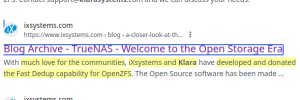
iXsystems: No one is being 'marooned' by Debian focus – Blocks and Files
TrueNAS producer iXsystems has encountered some user turbulence concerning a shift from a FreeBSD focus to Debian Linux.
It's saying, FreeBSD lacks the ability for features and functionality, unless someone in the community chooses to pick up on them. Also, iXsystems workers spent most of their time on improving FreeBSD rather than innovating. Unfortunately, it described FreeBSD as not picking up and not prioritized.
if people wanted to push FreeBSD forward for the last 15 years, they would have.
FreeNAS started in 2005, and stewardship was handed over to iXsystems in 2009. FreeNAS merges into TrueNas in March 2020. Since July 2020, TrueNAS has had a Linux version. https://www.truenas.com/freenas/
Screenshot from Februrary 2020 of FreeNAS https://web.archive.org/web/20200303161400/https://www.freenas.org/. FreeNAS based on FreeBSD had clients of: Salvation Army, Reuters, US governmental and military branches, United Nations, Disney and a few Universities.
Related: Thread ixs-plans-for-truenas-core-13-3.92883.
Edit: I can see lack of drivers for newer highspeed network hardware and feature functionality of that hardware as a reason to want to do that. Drivers can be imported to FreeBSD. The only problem would be when GPL inclusion would make the rest of the BSD licensed software to go under GPL, by including it. Still, that would be a FreeBSD based system.





